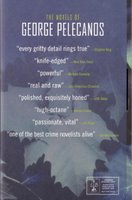- 62. The Night Gardener, George Pelecanos. Thriller, 7-5, p. 371
- 63. The Places In Between, Rory Stewart. Non-Fiction, 7-8, p. 297
- 64. No Good Deeds, Laura Lippman. Thriller, 7-10, p. 343
- 65. Heat, Bill Buford. Cooking, 7-13, p. 315
 Pelecanos’ The Night Gardener will be available in early August. It’s worth the wait. It’s vintage Pelecanos with many of his familiar themes.
Pelecanos’ The Night Gardener will be available in early August. It’s worth the wait. It’s vintage Pelecanos with many of his familiar themes.
The central story has to do with a cop, a retired cop and a former cop who are all trying to solve the murder of young man whose body is found in a community garden. To all appearances, the crime is connected with three murders that occurred 10 years earlier.
There’s complications, and that’s what makes the story so entertaining. The cop, Gus Ramone, knows the young man who was murdered and his family. The former cop left the force to evade a morals charge as a result of an investigation launched by Ramone.
This could be predictable stuff in a lot of writers hands, but not with Pelecanos who forces the men to closely examine their own lives, with surprising, but satisfying results.
There’s are a couple of secondary stories that briefly intersect with the main story of Ramone and the murder in the community garden.
It’s a taut, well-told thriller. If you have not read Pelecanos he should be at the top of your reading pile. He belongs with Michael Connelly, Robert Crais and Ian Rankin on the short-list of the genre’s best.
+++
 The Places In Between is Rory Stewart’s account of his walk across
The Places In Between is Rory Stewart’s account of his walk across
In many respects, it is a simple book. Stewart walks, stays the night with locals and walks again. But, of course, it’s
The book’s power is in Stewart’s ability to show and not to judge. He furnishes us with a insightful and sensitive portrayal of
+++
 My first introduction to Laura Lippman, which came in April, was Every Secret Thing. I wasn’t swept away, but that book was a one-off, not featuring her trademark P.I. Tess Monaghan. I've since read two books featuring Monaghan and she's won me. Rather, they-- Lippman and Monaghan -- have won me over.
My first introduction to Laura Lippman, which came in April, was Every Secret Thing. I wasn’t swept away, but that book was a one-off, not featuring her trademark P.I. Tess Monaghan. I've since read two books featuring Monaghan and she's won me. Rather, they-- Lippman and Monaghan -- have won me over.
Lippman’s newest book, No Good Deeds, is just a fun read. There’s a subset of the thriller in which the author piles so much adversity, trouble and woe upon her main character that you wonder how shey will ever extract herself from her misfortune. That’s what happens to Tess in No Good Deeds.
You know, Monaghan will turn things around, but you never know exactly how until it happens. Lippman does a superb job of keeping the surprises hidden until she springs them on the reader. It’s the perfect summer book.
+++
 Heat is Bill Buford’s second book. His first, Among the Thugs, is a classic among books on soccer. Heat may well become a classic of the cooking school of literature.
Heat is Bill Buford’s second book. His first, Among the Thugs, is a classic among books on soccer. Heat may well become a classic of the cooking school of literature.
The book is comparable on many levels to Anthony Bourdain’s Kitchen Confidential. Buford, an editor for The New Yorker, takes a job in the kitchen of Mario Batali’s three-star
While reading Heat you alternate between never wanting to dine out again and not being able to wait to dine out again, preferrably at Babbo. The book's ultimate success may be that Buford leaves you pondering a foray into the kitchen to fire up some elusive recipe for yourself.


No comments:
Post a Comment